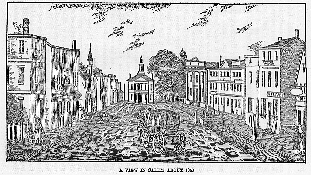Nathaniel Hawthorne
IV. NATHANIEL HAWTHORNE: 1804-1864.
In the historic town of Salem, well remembered for its sad delusion concerning witchcraft in colonial times, and better famed in New England tradition for many brighter and happier events, Nathaniel Hawthorne was born, July 4, 1804. William Hathorne,1 first of the line to appear in the colony, was an associate of Governor Winthrop, and was known as a persecutor of the Quakers; John, his son, was a judge, and left an unenviable reputation as a bitter searcher out of "witches," relentless in the treatment of his victims. Many of the Hawthornes were seafaring men -- for during those years Salem was a thriving seaport and practically controlled the rich East Indian trade. Nathaniel's grandfather commanded a privateer in Revolutionary times and figures as the hero of the ballad on Bold Hathorne. The novelist's own father, also Nathaniel, was captain of a ship at an early age; he died at Surinam only four years after his son was born. From the shock of this event Mrs. Hawthorne never recovered. To the end of her life, forty years afterward, she lived in seclusion, rarely emerging from her room, even taking her meals apart from her children.
Hawthorne's Childhood.
Under these peculiar conditions the child who was destined to take his place as the foremost writer of fiction in America, and one of the world's great romancers, passed into boyhood. It is not surprising that peculiarities of temperament were developed, or that even as a child he was lonely, sensitive, and shy. When Nathaniel was nine years old, the family lived for a time in Maine. Their home was on the shore of Sebago Lake, in a region that was then almost wild, where the boy enjoyed a freedom like that of the birds, but where the inclination for solitude was intensified.
At College.
When Hawthorne entered Bowdoin College, in 1821, his habits of seclusion were in a measure broken. He was a healthy, hearty youth, slender, but finely built, handsome and athletic. His comrades called him "Oberon." Here were begun two intimate and lifelong friendships that had no slight influence in his later career: the friendships with Horatio Bridge and Franklin Pierce, later President of the United States. With Longfellow, also a classmate, Hawthorne seems to have had rather a slight acquaintance; but this was cordially renewed in later years. The future story-teller was already meditating the possibility of a literary career; in the dedication of one of his volumes to his friend Bridge, he speaks of the fact. The passage gives us such a pleasing glimpse of these college days and intimacies that it deserves quoting: --
"If anybody is responsible for my being at this day an author, it is yourself. I know not whence your faith
came; but, while we were lads together at a country college, -- gathering blueberries, in study-hours,
under those tall academic pines; or watching the great logs, as they tumbled along the current of the
Androscoggin; or shooting pigeons and gray squirrels in the woods; or bat-fowling in the summer twilight; or
catching trouts in that shadowy little stream which, I suppose, is still wandering river-ward through the
forest, -- though you and I will never cast a line in it again, -- two idle lads, in short (as we need not fear
to acknowledge now), doing a hundred things that the Faculty never heard of, or else it had been the
worse for us, -- still it was your prognostic of your friend's destiny, that he was to be a writer of fiction."1
Salem.
The ensuing ten years were spent by Hawthorne in his native city. His mother and sisters had again established themselves in their former home, and the peculiar habits of seclusion that had so colored Nathaniel's childhood were now resumed. The young man became a recluse. His meals were left before
| Previous chapter | Back | Home | Email this | Search | Discuss | Bookmark | Next chapter/page |
See our FAQ for more details.